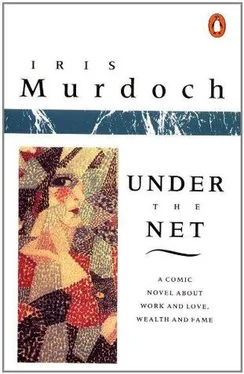'So Maggie's done it at last!' I said. Mars thrust his head under my arm and sniffed at the little beasts with condescension. I put them back in the box.
'What puzzles me,' said Mrs Tinckham, 'is why those two should be pure Siamese and the other ones quite different, instead of their all being half tabby and half Siamese.'
'Oh, but that's how it always is. It's quite simple,' I said. 'Why is it then?' said Mrs Tinck.
'Well,' I said, 'it's just a matter of...' I stopped. I had no idea what it was a matter of. I laughed and Mrs Tinckham laughed.
'I don't know why it is,' I said. 'It's just one of the wonders of the world.'
The End
About the Author
Iris Murdoch was born in Dublin of Anglo-Irish parents. She went to Badminton School, Bristol, and read classics at Somerville College, Oxford. During the war she was an Assistant Principal at the Treasury, and then worked with U.N.R.R.A. in London, Belgium and Austria. She held a studentship in philosophy at Newnham College, Cambridge, for a year, and in 1948 returned to teach philosophy in Oxford as a Fellow of St Anne's College. In 1956 she married John Bayley, teacher and critic. She was awarded the C.B.E. in 1976 and was made a D.B.E. in the 1987 New Year's Honours List.
Her other novels are The Flight from the Enchanter (1955), The Sandcastle (1957), The Bell (1958), A Severed Head (1961), An Unofficial Rose (1962), The Unicorn (1963), The Italian Girl (1964), The Red and the Green (1965), The Time of the Angels (1966), The Nice and the Good (1968), Bruno's Dream (1969), A Fairly Honourable Defeat (1970), An Accidental Man (1971), The Black Prince (1973), winner of the James Tait Black Memorial Prize, The Sacred and Profane Love Machine (1974), winner of the Whitbread Prize, A Word Child (1975), Henry and Cato (1976), The Sea, the Sea (1978), for which she won the Booker Prize, Nuns and Soldiers (1980), The Philosopher's Pupil (1983), The Good Apprentice (1985) and The Book and the Brotherhood, both shortlisted for the Booker Prize and The Message to the Planet. She has also written The Fire and the Sun: Why Plato Banished the Artist (1977), based on her 1976 Romanes lectures, and A Year of Birds (1978), a volume of poetry, and Acastos: Two Platonic Dialogues (1986).
BY THE SAME AUTHOR
'Of all the novelists that have made their bow since the war she seems to me to be the most remarkable... behind her books one feels a power of intellect quite exceptional in a novelist'
--Raymond Mortimer in the Sunday Times
The Book and the Brotherhood
Many years ago Gerard Hernshaw and his friends 'commissioned' one of their number to write a political book.
Time passes and opinions change. Why should we go on supporting a book which we detest? Rose Curtland asks. The brotherhood of Western intellectuals versus the book of history, Jenkin Riderhood suggests. The theft of a wife further embroils the situation. Moral indignation must be separated from political disagreement. Tamar Hernshaw has a different trouble and a terrible secret. Can one die of shame? In another quarter a suicide pact seems the solution. Duncan Cambus thinks that since it is a tragedy, someone must die. Someone dies. Rose, who has gone on loving without hope, at least deserves a reward.
'A thoroughly gripping, stimulating, and challenging fiction'--The Times










